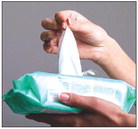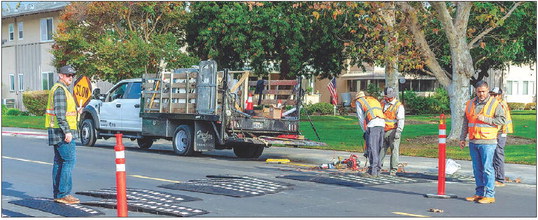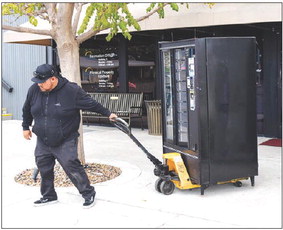Thoughts on Veterans Day
by Michael McGrorty
LW contributor
There was a time not so long ago when being a veteran was not an especially enviable position. A failed war in Southeast Asia brought blame upon the military and those who had fought. This situation turned around after the Mideast wars, when the public suddenly began a reverence for veterans that continues to this day.
I often wear an old Navy PT shirt out in the community, and it’s common for people to offer thanks for my service. This surprises me, but I’ve learned to reply “no, thank you” to these kind folks. The reason for this is that I came out far better in the exchange.
For me, the Navy was a way out of several problems: first, my father had died, leaving us with little income. Apart from that, the economy was in a recession and there were no jobs. I was at that time only 17, no more mature than most boys and certainly unprepared for college.
Boot camp was the first day of my adult life, which is to say, the world of responsibility and consequences. They fooled us into thinking they were training us to be sailors, but the truth was, they were training us to leave childhood behind. In that place, alongside the harbor in San Diego, hundreds of kids like me learned to follow directions, to perform complex tasks, and especially, to abandon the sense of self for the ideal of group success.
It’s a hard thing for a kid who can’t even vote to be told, “You’re here to learn how to fight a war for your country. Some of you will die doing that, when the hour comes.” The most impressive sight of the whole time was seeing a battle dressing, a huge rectangle of gauze, that we were taught to tie around the abdomen of a casualty whose guts had been blown out. These bandages were tinted red, as if to give a hint of what lay ahead.
We learned to fight ship fires by being put on a grating above a tank of diesel fuel that was set ablaze. If you didn’t fight the fire effectively, you were simply barbecued. (Meanwhile, somewhere back home, my high school mates were getting tanned on the beach.) As a conclusion to this course of education, I spent a week cleaning trays in the base scullery, from before dawn to after dark.
I served on three ships and found that being a clerk meant only what you were supposed to do for eight of the 24 hours each day, the rest being filled with other work and occasionally, sleep. There were two worlds: in-port, and at sea. Being in-port gave the illusion of normalcy within the Navy format, but we were always busy. Being at sea was like leaving the earth—not for another plane, but for a long ride on an endless liquid desert, featureless until it got angry and decided to drown us. Being on a destroyer is like sitting in a steel shoebox astride a running motor, with a load of bombs beside you. The shoebox bucks and rolls, and you somehow have to maintain work and sanity in a pitching netherworld where time essentially stops. You and a couple hundred of your friends will do this for more than half a year, occasionally stopping at some foreign port to fuel yourselves up before returning to America again.
The whole experience changes you.There is a trauma attached to it that’s never lived down. You have less space than federal prisoners and considerable responsibility. You refuel the ship in rough weather, stand watches in freezing cold, dodge helicopter blades, lift heavy objects and carry on until relieved. I saw people get injured; I saw them die. I found out that those battle dressings work quite well on an amputated foot. I got sideways with a shipmate and found out how it hurts to get your face stitched up without anesthetic.
There were compensations: I saw Hong Kong on a New Year’s Day, when the air was crisp as rice paper and its cobbled backstreets filled with the scent of tea and incense. I visited Australia and was treated to lunch by a couple of total strangers who couldn’t thank me enough for saving them in the war that had ended a generation before. I saw Hawaii, the Philippines, Alaska, atolls lost in the vastness of the Pacific, Korea in a winter so cold the snow blew through Busan like talcum powder in the streets. I spent a year homeported in Japan, taking every possible moment to ride the trains as far as my money would let me, seeing lots of country, including the incredible Tokyo, sprung up from the firestorms of the war to a beautiful, confusing, neon-lit giant of a city.
We were out once off the coast of Honshu on a training cruise, working around the clock to pass qualifications. It was hard work and wearing. We went to battle stations over and over, drilling and drilling, in daytime, at night, endlessly. One day we broke for lunch and then as usual, some of us went to the fantail for coffee and a smoke. It was overcast, but all at once the clouds parted to reveal the snow-capped peak of Mount Fuji, serene and beautiful. For once none of us had any words. We just finished out drinks and went inside for more drills. That, my friends, was the Navy I served in, the one you gave to me. I owe you for all that, and manhood, and a few other details courtesy of the G.I. Bill.
But if you want to thank me, do this: have your kids or grandchildren join the service. It will do them, and the country, much good.




